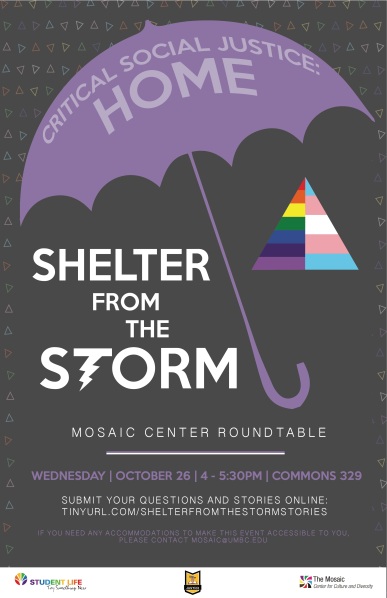A blog reflection by Joe Levin-Manning, Graduate Coordinator for LGBTQ Programs
In our society today there are numerous people without the tangible home that we label as homeless or home-challenged; but have we thought about those that are lacking home security/stability? Many vulnerable groups are on the verge or edge of losing the homes they have currently. These people include (but aren’t limited to) the LGBTQ community, lower income persons/families, and immigrants. These groups are often the subject of discrimination just because they exist.
Home is usually defined as a place a person goes for shelter, for safety, and for a sense of normalcy. Home is something we think of as both a literal and a figurative place in our society. But what truly makes a home a home? How is it decided who gets a home and who doesn’t? How do you get to keep a home that you may have created or earned for yourself?
For many LGBTQ individuals, myself included, you worry what will happen when you come out to someone. Whether that person is a family member, a friend, a colleague, or a boss. It is a nerve-wracking experience that can have dire consequences. For those that are unaware, there are many intangible things on the line in addition to all of the tangible one. It goes beyond the loss of a place to call home, which is a traumatic experience in its own right. You start to lose your self of self.
For many of us, so much of who we are is made up or defined by our homes. Your parents/families are the first to give you a set of values to believe in. At home is when you are taught to feel safe and comfortable. The security that you feel at home is supposed to make you feel strong and confident. However, these things are only true if you feel that you belong there. Even if you are living in a home you may not feel at home if you are not able to be truly and completely yourself. In those situations, is that really a home? Is this a place that you are meant to be? Many are forced to say yes because you need the physical, financial, and practical support that is associated with it. Like many others, I did not know how I could or would afford to finish college without the support of my “family”. In this situation, you are forced to hide who you are or to be someone other than yourself.
For some, coming out is a story of acceptance, love, and familial warmth. For others, coming out is a story of pain, longing, loss, and hope. The pain of rejection that stings to the very depth of your soul. The longing for an idea of how things could have been if you were born any other way. The loss of the future you thought you had or the stability and support you need. The hope you force yourself to believe in until you finally find the place you were meant to be full of love, laughter, and support. The journey and the struggles that one faces along this path will be different from the next person but all have one thing in common. They all shape us to be something more than we thought or imagined and it is the price we paid for our sense of home today.
(“Family” – the person you are related to by blood or law. Not to be confused with family – those that you chose to be members of your support network.)
Joe Levin-Manning
Graduate Coordinator for LGBTQ Programs
This piece was written as we look forward to Critical Social Justice: Home next week. Student Life’s Mosaic: Center for Culture and Diversity will be hosting a roundtable discussion about the struggles of homelessness as it affects the LGBTQ community in many different facets.
If you would like to send questions in advance or submit your own story to be shared during the event please visit: tinyurl.com/shelterfromthestormstories.

